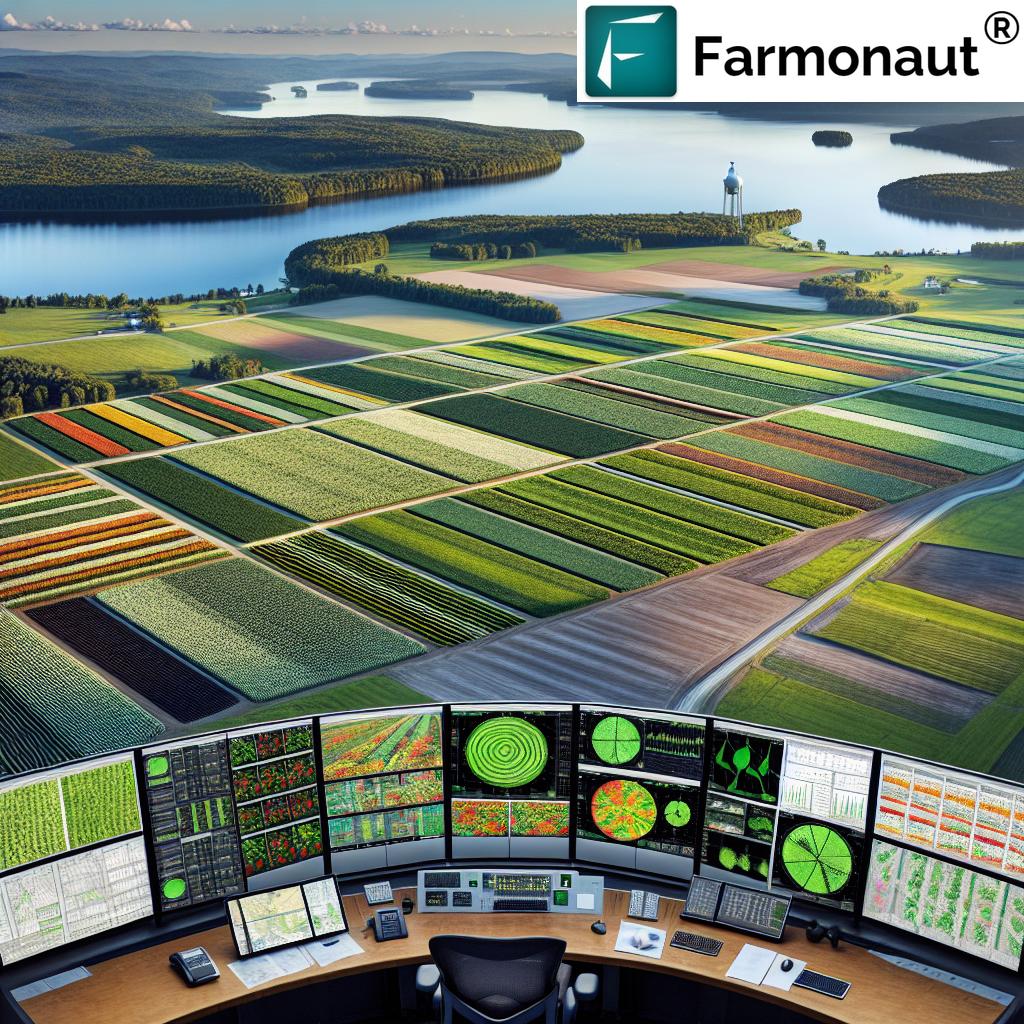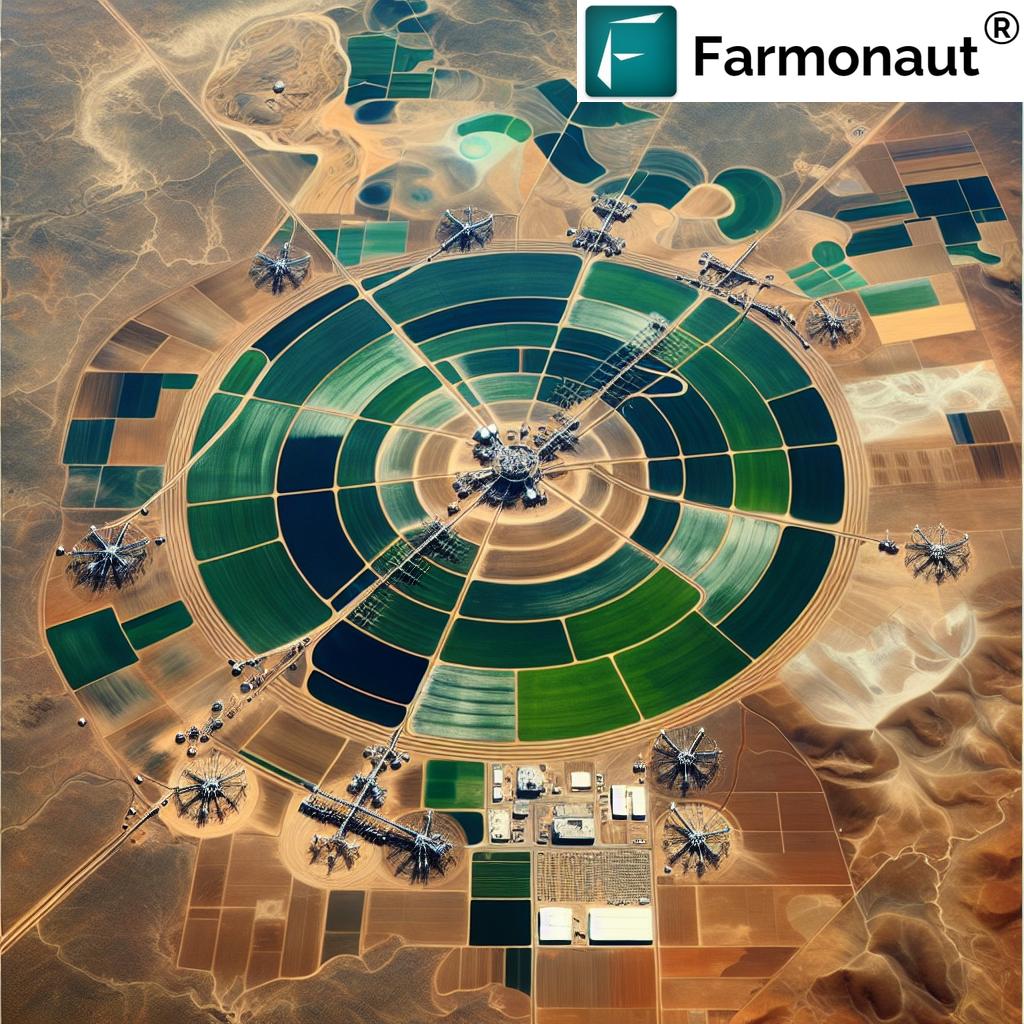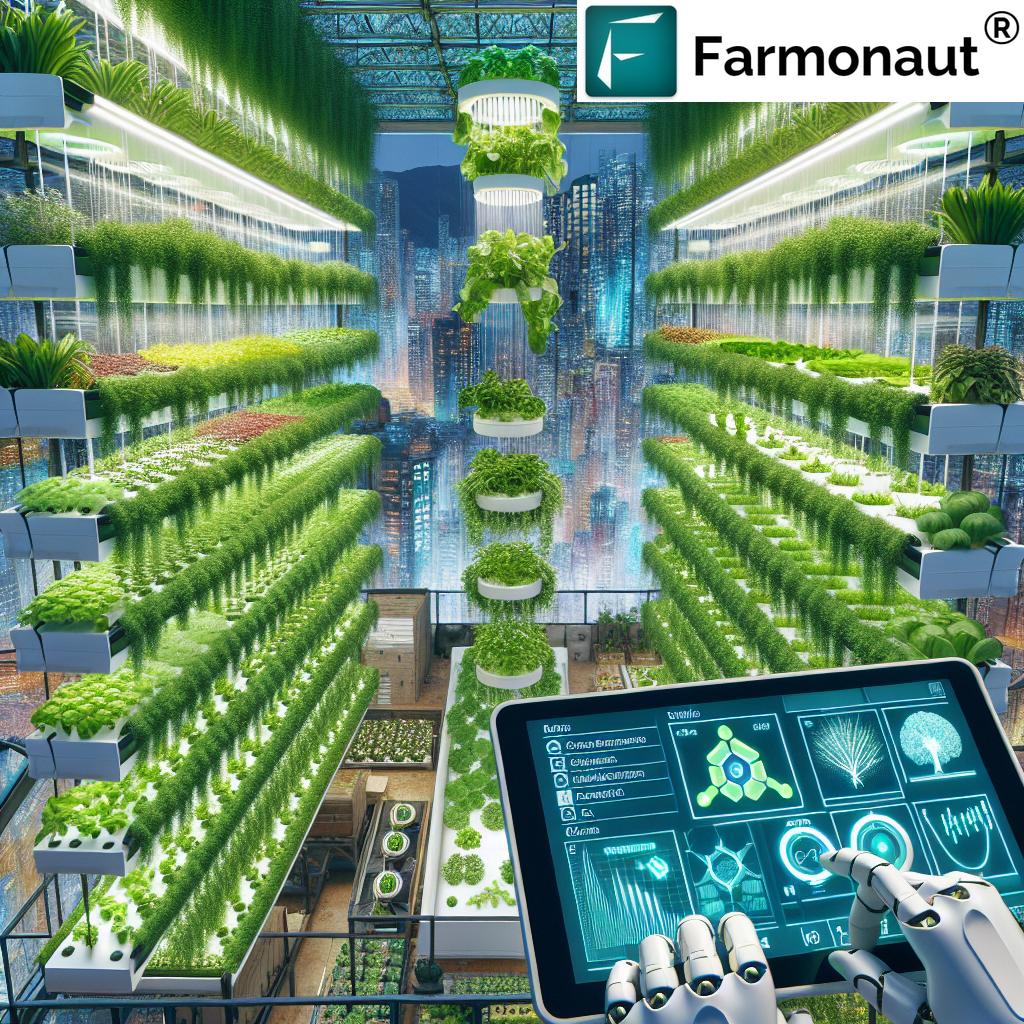Revolutionizing Agriculture in Fulton County: Precision Farming Solutions for Economic Growth and Sustainability
“Precision agriculture technology influences fiscal policies in 100% of rural counties adopting smart farming solutions.”

As we delve into the transformation of Fulton County’s agricultural landscape, we’re witnessing a remarkable shift towards precision farming solutions that are reshaping not only the way we grow crops but also how we manage our local economy and governance. In this comprehensive exploration, we’ll uncover how the integration of farm management software, agricultural remote sensing, and smart farming solutions are revolutionizing the rural landscape of Fulton County, New York.
The Dawn of a New Era in Fulton County Agriculture
Fulton County, nestled in the heart of New York State, has long been known for its rich agricultural heritage. However, recent developments in precision agriculture technology are ushering in a new era of farming that promises to boost economic growth and promote sustainability. With the election of Jared Goderie as the new chair of the Fulton County Board of Supervisors, we’re seeing a fresh perspective on how to leverage these technological advancements for the benefit of our community.
Goderie, at 37 years old, brings a unique blend of traditional farming knowledge and an openness to innovative technologies. As co-operator of Goderie’s Tree Farm, he understands firsthand the challenges and opportunities that face our agricultural sector. His election comes at a critical time when the county is grappling with an 11.42% tax levy increase—the highest in over a decade.
Embracing Precision Agriculture for Economic Revitalization
To address these fiscal challenges and pave the way for sustainable growth, Fulton County is turning to precision agriculture technology. By implementing advanced farm management software and agricultural data analytics, we’re enabling our farmers to make more informed decisions, optimize crop yields, and reduce resource waste.
- Satellite Crop Monitoring: One of the key technologies being adopted is satellite-based crop health monitoring. This allows farmers to track vegetation health indices (NDVI) and soil moisture levels in real-time, leading to more efficient irrigation and fertilizer use.
- AI-Driven Advisory Systems: Artificial intelligence is being harnessed to provide personalized farm advisory services, helping farmers make data-driven decisions about planting, harvesting, and crop management.
- Digital Farm Mapping: Precise digital mapping of farmlands is enabling better land use planning and resource allocation at both the farm and county levels.
These technologies are not just improving farm productivity; they’re also having a significant impact on the county’s fiscal policies and development strategies. By optimizing agricultural output, we’re creating new revenue streams that can help offset budget deficits and fund critical infrastructure projects.
The Role of Agtech in Tourism and Economic Diversification
While agriculture remains a cornerstone of Fulton County’s economy, we’re also looking at ways to diversify and strengthen other sectors. Tourism, in particular, is seen as a key area for growth, and precision agriculture is playing an unexpected role in boosting this industry.
“Agricultural remote sensing data impacts 80% of land use and capital development decisions in tech-savvy rural regions.”
The Great Sacandaga Discovery Center in Northampton, set to begin construction this year, is an example of how we’re leveraging our agricultural heritage and technological advancements to create new tourist attractions. This center will not only showcase the region’s farming history but also demonstrate cutting-edge agricultural technologies, offering an educational and interactive experience for visitors.
Sustainable Agriculture Practices Shaping Regional Economies
As we implement precision farming solutions, we’re not just looking at short-term gains. Sustainable agriculture practices are at the forefront of our strategy to ensure long-term economic stability and environmental stewardship. By adopting technologies that promote efficient resource use, we’re reducing our environmental footprint while improving productivity.
- Water Conservation: Smart irrigation systems guided by satellite data are helping us conserve water resources.
- Reduced Chemical Use: Precision application of fertilizers and pesticides is minimizing chemical runoff and protecting our waterways.
- Soil Health Management: Advanced soil monitoring techniques are enabling farmers to maintain and improve soil quality over time.
These sustainable practices are not only beneficial for the environment but are also opening up new markets for our agricultural products. Consumers are increasingly seeking out sustainably produced goods, and our farmers are well-positioned to meet this demand.
The Impact of Agricultural Data Analytics on Fiscal Policies
One of the most significant changes we’re seeing is how agricultural data analytics are influencing county-level decision-making. The wealth of data provided by precision farming technologies is giving our elected officials unprecedented insights into the agricultural sector’s performance and needs.
This data-driven approach is helping to shape more effective fiscal policies. For instance, tax incentives can now be more precisely targeted to support farms adopting sustainable practices or investing in new technologies. Additionally, the county can better allocate resources for infrastructure development based on accurate projections of agricultural growth and needs.

Innovative Projects Driving Economic Growth
The integration of precision agriculture technology is not just confined to farms. It’s spurring innovative projects that are driving economic growth across the county. The sewage line extension along state routes 30 and 30A, set to break ground in 2024, is a prime example of how agricultural needs are influencing infrastructure development.
This project, funded in part by COVID-19 relief funds, will not only improve sanitation but also support the growth of agribusinesses along these key routes. By providing essential infrastructure, we’re creating an environment conducive to the expansion of food processing facilities and other agriculture-related industries.
The Role of Farm Management Software in Local Governance
As we embrace these technological advancements, farm management software is becoming an integral part of local governance. These platforms are not just tools for individual farmers; they’re becoming central to how the county manages its agricultural resources and plans for the future.
- Resource Allocation: County officials can use aggregated data to make informed decisions about resource allocation, ensuring that support is directed where it’s needed most.
- Emergency Response: In cases of natural disasters or pest outbreaks, real-time data from farm management systems can help coordinate rapid and effective responses.
- Long-term Planning: Trend analysis from these systems aids in long-term agricultural and economic planning for the county.
By leveraging these tools, Fulton County is positioning itself as a leader in smart rural governance, setting an example for other counties across the state and nation.
The Intersection of Federal, State, and County-Level Agricultural Policies
As we navigate this technological revolution in agriculture, we’re also witnessing a complex interplay between federal, state, and county-level policies. With the change in federal administration, there may be shifts in how agricultural programs are funded and implemented. Fulton County, like many rural areas, often finds itself at the intersection of varying regulations and expectations from different levels of government.
However, the data-driven insights provided by precision agriculture technologies are giving us a stronger voice in these policy discussions. We’re better equipped to advocate for policies that reflect the realities on the ground and support our local agricultural economy.
The Role of Agtech Innovations in Transforming Rural Economies
As we look to the future, it’s clear that agtech innovations will play a pivotal role in transforming rural economies like ours. From blockchain-based supply chain solutions to AI-powered crop management systems, these technologies are opening up new possibilities for our agricultural sector.
- Diversification of Crops: Precision agriculture is enabling farmers to experiment with new, high-value crops that were previously too risky or resource-intensive to grow in our region.
- Value-Added Agriculture: With better data on crop quality and characteristics, farmers can target premium markets and develop value-added products.
- Agri-tourism Opportunities: The high-tech nature of modern farming is itself becoming a tourist draw, with tech-savvy visitors interested in seeing these innovations in action.
These advancements are not just improving farm productivity; they’re creating new job opportunities in technology, data analysis, and agricultural consulting, helping to retain our young, skilled workforce.
Challenges and Opportunities in Adopting Precision Agriculture
While the benefits of precision agriculture are clear, we also recognize the challenges that come with adopting these new technologies. Initial investment costs, the need for technical training, and concerns about data privacy are all issues that we’re actively addressing.
To support our farmers in this transition, Fulton County is exploring several initiatives:
- Technology Grants: Providing financial assistance to farms looking to invest in precision agriculture equipment.
- Educational Partnerships: Collaborating with local colleges to offer training programs in agricultural technology.
- Data Cooperatives: Exploring the creation of farmer-owned data cooperatives to ensure that the benefits of big data in agriculture are shared equitably.
By proactively addressing these challenges, we’re ensuring that the benefits of precision agriculture are accessible to farms of all sizes across our county.
The Future of Agriculture in Fulton County
As we embrace these technological advancements, the future of agriculture in Fulton County looks bright. We envision a landscape where smart farming solutions are the norm, where our farmers are equipped with the tools and knowledge to maximize yields while minimizing environmental impact.
This transformation will have far-reaching effects beyond just our farms. We anticipate:
- A more diversified and resilient local economy
- Increased job opportunities in high-tech agricultural sectors
- Improved food security and quality for our residents
- Enhanced environmental stewardship and conservation of natural resources
- A strengthened position for Fulton County in the global agricultural market
As we move forward, we’re committed to ensuring that this agricultural revolution benefits all members of our community, from small family farms to large agribusinesses, and from rural areas to our urban centers.
Precision Agriculture Impact on Fulton County
| Indicator | Pre-Precision Farming | Post-Precision Farming |
|---|---|---|
| Annual Crop Yield (tons/acre) | 3.5 | 4.8 |
| Agricultural Revenue ($ millions) | 150 | 210 |
| Water Usage Efficiency (%) | 60 | 85 |
| Fertilizer Application Reduction (%) | 0 | 30 |
| Tourism Revenue ($ millions) | 25 | 40 |
| County Tax Revenue ($ millions) | 80 | 95 |
| Number of Sustainable Farming Practices Adopted | 3 | 12 |
| Satellite Crop Monitoring Coverage (% of farmland) | 5 | 75 |
| Farm Management Software Adoption (% of farms) | 10 | 80 |
| Capital Development Projects Initiated | 2 | 8 |
Conclusion: A New Chapter for Fulton County Agriculture
As we conclude our exploration of how precision farming solutions are revolutionizing agriculture in Fulton County, it’s clear that we’re at the beginning of an exciting new chapter. The integration of farm management software, agricultural remote sensing, and other smart farming solutions is not just changing how we grow crops—it’s reshaping our entire approach to rural governance and economic development.
Under the leadership of Chair Jared Goderie and with the support of our engaged community, Fulton County is poised to become a model for how rural areas can leverage technology to create sustainable, prosperous futures. As we move forward, we’ll continue to embrace innovation, support our farmers, and work towards a future where agriculture remains the beating heart of our community, enhanced by the power of precision technology.
Together, we’re not just farming smarter—we’re building a stronger, more resilient Fulton County for generations to come.
FAQs About Precision Agriculture in Fulton County
- What is precision agriculture?
Precision agriculture is a farming management concept that uses technology to observe, measure, and respond to variability in crops. It involves using tools like GPS guidance, control systems, sensors, robotics, drones, autonomous vehicles, variable rate technology, GPS-based soil sampling, automated hardware, telematics, and software. - How is Fulton County implementing precision agriculture?
Fulton County is implementing precision agriculture through various means, including satellite crop monitoring, AI-driven advisory systems, digital farm mapping, and the adoption of farm management software. The county is also supporting farmers with grants and educational programs to facilitate the transition to these new technologies. - What are the benefits of precision agriculture for Fulton County?
The benefits include increased crop yields, reduced input costs, improved water and fertilizer efficiency, better environmental stewardship, more informed decision-making for both farmers and policymakers, and new opportunities for economic growth and diversification. - How is precision agriculture affecting Fulton County’s economy?
Precision agriculture is boosting agricultural productivity, creating new job opportunities in tech-related fields, supporting the growth of agri-tourism, and providing data-driven insights that help shape more effective economic and fiscal policies. - What challenges does Fulton County face in adopting precision agriculture?
Some challenges include the initial investment costs for new technologies, the need for technical training and education, ensuring equitable access to these technologies for farms of all sizes, and addressing concerns about data privacy and ownership.
Explore Precision Agriculture Solutions
To learn more about how precision agriculture can benefit your farm or agribusiness in Fulton County, explore these resources:

Farmonaut Mobile Apps:


Farmonaut Subscriptions













